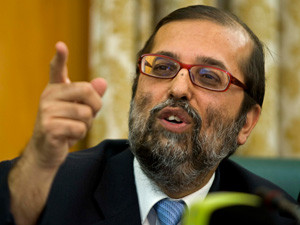
While SA's government and private sector sit and play the blame game, the rest of the world is moving on; cooperating and developing ICT to the end benefit of all.
This came out of an at times heated debate between communications minister Yunus Carrim and CEOs of two local ICT companies, Derek Wilcocks, of Dimension Data, and Benjamin Mophatlane, of Business Connexion, yesterday.
Filmed live by CNBC Africa, at the University of Johannesburg, the "Meeting of the Minds" debate was prompted by the fact that ICT is one of the most important economic drivers to have emerged for Africa over the past decade - if not more - and the ongoing discussions and lingering questions around how to grow the sector.
Despite the inevitable differences between government and the private sector, the overriding sentiment emerging from both sides was that mutual investment and cooperation is crucial if SA - and Africa at large - want to grow the economy, attract investment and compete on a global ICT stage.
While panellists were able to agree on what underpins an ideal ICT ecosystem, the fact that there are underlying challenges standing in the way of reaching the ideal was glaring.
Holding to ransom
Carrim pointed out that, while there has been a dramatic increase in cellphone use on the continent, Africa still falls way short of its potential. "There is still only 18% of the continent that has access to broadband."
He said there are many factors at play in building a better ICT sector, but the bottom line was that public and private ties had to be strengthened.
"Many say regulatory policy is to blame for the lack of growth in the sector and yes, that is a part of it - but that is not the sole problem. On its own, a sound regulatory environment will not solve the problem."
Carrim conceded that government had fallen short, but said, from its side, the private sector was not doing enough to grow ICT either - and that it was in fact holding the sector back with "bickering".
He fingered SA's operators, broadcasters and manufacturers as the primary stumbling block, citing the ongoing feuds over set-top box control and mobile termination rates. "[These private entities] are holding SA ransom. Iran and Somalia are moving on and we are still stuck in feuds."
Policy problem
Wilcocks and Mophatlane, in turn, pointed to the execution of government policy as being one of the key drivers that they believe has been neglected by government.
While there is currently a review of ICT policy under way, in the form of a green paper, it has been 15 years since policy reviews took place. There have been three white papers and one green paper introduced in ICT since the democratisation of SA.
Referring to the Electronic Communications Act (ECA) of 2005, Wilcocks said: "The ECA envisaged a converged world, but in reality there is still a lot of focus on voice. And voice is not going to drive most of the growth going forward. The top-level frameworks speak about convergence, but on the ground, data is still expensive. We need to figure out ways to give people affordable access to data."
Broadband and Internet connectivity, agreed Wilcocks and Mophatlane, will be the main driver of economic growth in Africa - a sentiment reinforced by Carrim: "Studies show that, for every 10% increase in broadband penetration, you get a 1.38% increase in gross domestic product."
Wilcocks said policy would have to evolve quicker, but more importantly, it would have to be executed appropriately. "It is not so much the policy that is the problem - it's about how that policy gets enacted."
To see policy enactment realised, said Mophatlane, there has to be willingness from both government and the private sector.
Monopoly mire
With Mophatlane in agreement, Wilcocks said businesses were hamstrung by the high cost of communications - an area where government should rightfully step in, as with the Independent Communications Authority of SA's new termination rates - which Vodacom and MTN have delayed with court cases.
"[The cost of communications problem] is symptomatic of the structure in the telecoms industry we have had for over 15 years. It is an industry with a natural monopoly and this results in some very powerful companies that can afford what is required to accelerate or retard things to the advantage of their business.
"If you look at mobile data, we've struggled for the last decade to enter into adequate mobile data reselling agreements with the mobile operators. No sooner do we enter into an agreement than we find the mobile operators undercut the mobile rates provided to us to their customers.
"So I do think that we need to create an environment where we all want to move forward in the interest of the client - whether consumer or business."
Mophatlane said lowering the cost of communications would allow South Africans to innovate. "[But] the emphasis is voice, while the reality is that our industry will drive this. It's all about broadband."
* Meeting of the Minds: Connecting Africa/The ICT Agenda will be broadcast on CNBC Africa (DStv channel 410) on Wednesday, 26 March.
Share